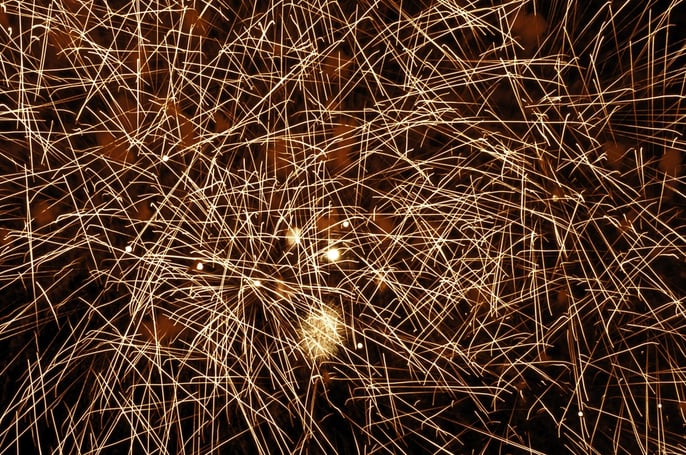
Fireworks are beautiful and a pleasure to watch for most people, but the enjoyment can come at a price for migraineurs. With New Year almost upon us it’s possible you could forget the risks posed by an NYE celebration complete with a glorious light show, and end up suffering as a result.
Here’s why fireworks could trigger a migraine, and how you can get to experience the event while protecting your senses from overload.
More Sensory Connections, More Risk of Pain
For migraine patients, a primary factor in whether fireworks cause migraines is the way the brain processes different types of sensory stimulation. Some people have a stronger connection between the neural networks that process incoming sensory information and the way the stimulation affects them.
A 2015 MRI study of 15 patients without aura who had light and sound sensitivity showed that compared with control patients, the areas of the brain that processed vision and hearing had more connections. Researchers speculated this could “set the stage” for an abnormally intense response to sensory information.
Fireworks also result in fumes with a fairly strong odor, caused by the sulfur content in the explosives. For patients with a sensitivity to smell, this can also help to trigger a migraine.
The Noise Factor with Migraines
Noises are often reported as the cause of headaches, both migraines and regular ones. It’s a scientifically proven fact that sound can be a headache trigger, even for people who don’t commonly develop headaches.
People who have frequent headaches usually have a lower tolerance for noise, too, and the headaches they develop are more intense than the pain experienced by those who don’t get them often. This means migraine patients are more vulnerable to loud noise as a possible trigger than non-patients.
Studies show some patients have a dilation of the temporal blood vessel that allows increased release of proteins such as CGRP, which contributes to brain inflammation and the likelihood of headache pain.
While it’s unclear exactly how noises cause headaches, researchers believe it could well be connected to blood vessel dilation.
The Photophobia Phenomenon
Light sensitivity or photophobia is a well-known issue for many migraine patients. Whether it’s caused by non-incandescent light sources found in offices or the glare from computer screens, light is often identified as the reason for the onset of an attack. With fireworks, the brightness and color of the lights accompanied by activity such as flashes or bursts makes this type of light an easy culprit for causing headaches.
Stress and Excitement
You might not realize you’re experiencing these, but while a holiday event with your family is about as enjoyable as life gets, the feelings of excitement that accompany it can be a factor in the onset of a migraine.
Add to that the tension you could feel if you’re dealing with young children who may be overtired, nervous of the fireworks or squabbling with their siblings, and you have the perfect mix for a stressful occasion.
The Risk of Hyperarousal
Apart from their individual ability to trigger migraines, the combination of these conditions can lead to nervous system hyperarousal. This results in sleep disturbances, fatigue, eyestrain, and hypersensitivity to odors, all of which can cause secondary headaches or migraine attacks long after the fireworks are over.
Protective Measures for Migraine Pain
So what can you do to protect yourself during festive firework displays, if you really can’t avoid them entirely?
- Find a spot to watch the fireworks that is far enough away to escape the fumes, at least. This will also help to reduce the noise levels and vibration, which won’t be quite as loud as they will otherwise.
- Wear earplugs to muffle the sound a bit more—if you get the moldable wax type nobody even needs to know you’re wearing them.
- Give yourself a hip image by plugging into some relaxing music and playing it through your noise-canceling headphones.
- Try noise desensitization therapy ahead of the event.
- Wearing tinted glasses is often helpful even at night to reduce the impact of the visual display.
- Find a spot to watch from that enables you to turn away during the initial burst of light.
- If all else fails, closing your eyes at strategic moments can help reduce the strain on your senses.
Make sure you’re up to date on any anti-anxiety medication, rested and well-nourished, to be in the best physical condition possible.
These steps will help you to be better equipped to handle whatever the event throws your way, and who knows--you might even get to enjoy it, just a bit.


